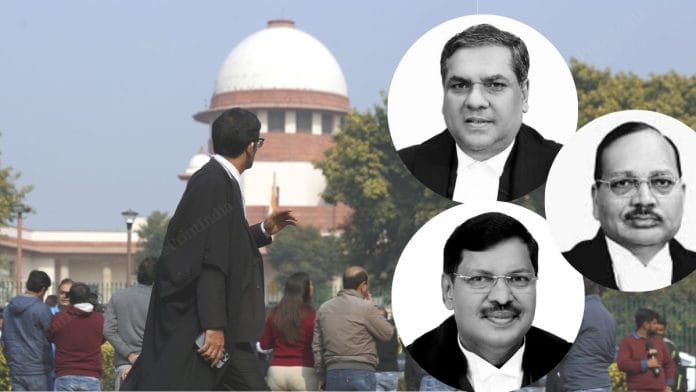New Delhi: Nearly every Tuesday since January, the Supreme Court Collegium has sat down with prospective candidates for high court judges, asking them questions about the law and important apex court rulings, as part of a self-evolved interview mechanism introduced last year, ThePrint has learnt.
According to sources in the Supreme Court registry, the three-member appointment panel, led by Chief Justice of India Sanjiv Khanna and comprising Justices B.R. Gavai and Surya Kant, interviews prospective candidates almost every Tuesday during the court’s post-lunch working hours.
“After finishing their judicial work in the first half of the day, the collegium was convened every Tuesday post 2 pm to speak to the candidates personally,” one of the sources said.
In the last three months, it has approved proposals for the high courts of Delhi, Allahabad, Gujarat, Telangana, Andhra Pradesh, Patna, Calcutta and Rajasthan.
For Delhi, the collegium cleared the names of two judicial officers, while for Allahabad, eight judges from the trial court and two lawyers were approved. Eight judicial officers for Gujarat, four for Telangana and two for Andhra Pradesh were also recommended for elevation. The collegium found five lawyers suitable for Patna and Calcutta each, while seven were given the green signal for Rajasthan.
According to the memorandum of procedure on judicial appointments, each high court first prepares a list of suitable candidates for judgeship. The lists are then forwarded to the central government as well as to the Supreme Court.
While the high courts provide information about the candidate’s professional achievements as well as their financial status, the central government carries out a background check of the candidate through an enquiry conducted by the Intelligence Bureau. After collating this information, the Centre processes the high court’s proposal and then submits it to the top court collegium for further deliberations.
The procedure does not talk about conducting personal interviews of candidates. This is a self-evolved process, which the collegium re-introduced in December end last year, soon after a controversy involving an Allahabad High Court judge.
In December 2024, Justice Shekhar Kumar Yadav, while speaking at an event organised by right-wing organisation Vishwa Hindu Parishad’s legal cell, sparked controversy after he asked how Muslim children could be kind and tolerant when animals were being slaughtered in front of them since childhood, without specifically naming the community.
The source quoted above said, “Justice Yadav’s controversy pushed the present collegium members to re-start the interview process, which was introduced in 2018 when Justice Dipak Misra was the CJI.”
Also Read: Legal pedigree not just entrenched in SC. 1 in 3 HC judges related to judges, ex-judges or lawyers
Questions on latest rulings, Constitution
While some names are cleared, many candidates, the sources in the Supreme Court registry said, were not approved because they were found lacking in merit. The collegium members come to this conclusion on the basis of personal interactions and background material provided to them by the respective High Courts and Centre.
For instance, in Delhi’s case, the names of seven judicial officers were placed before the collegium. However, only two were cleared. Similarly, sources said, only eight out of 14 judicial officers recommended for elevation to Allahabad High Court were cleared by the top court appointment panel. The collegium had also trimmed the list of lawyers in the case of Allahabad. While the names of 10 lawyers were sent, the top court collegium gave its nod to only two.
Telangana’s list was also pruned from five to four judicial officials, whereas Andhra Pradesh High Court’s proposal to elevation three was brought down to two.
Out of 11 lawyers interviewed for Patna, the Supreme Court collegium chose only five. While in Rajasthan the collegium cut down the proposed list from 14 to seven, it found five out of eight lawyers suitable to become judges of the respective high courts.
However, in the case of Gujarat, the collegium found all eight judicial officers figuring in the original list prepared by the HC suitable for elevation.
Sources from the Supreme Court told ThePrint that the collegium interacts with each candidate for no less than 10 minutes. This duration can increase up to 15 minutes as well.
The candidates are not given any prior briefing about what the interactions would entail. However, to ensure that these interviews do not sound like a test, the collegium members prefer to ask questions about relevant laws and the latest judgments.
“The questions put to the candidates vary and revolve around existing laws, Constitution as well as important Supreme Court rulings,” one of the sources said.
Speaking about one of the recent interactions, another source said that a lawyer from a particular high court was unable to give satisfactory answers to questions revolving around the Constitution. In another case, the lawyer’s professional practice was not up to the mark and the collegium members were only convinced of it after they interacted with the person.
Though these interactions help collegium members carry out a personality assessment of lawyers and judicial officers tipped to become judges, the final outcome is rooted in wholesome evaluation of the candidates, including their background, integrity, number of cases dealt, and quality of judgments in case of judicial officers.
(Edited by Sanya Mathur)
Also Read: Lineage runs deep in India’s Supreme Court. 60% judges are from lawyer or judge families






